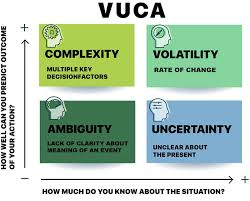Enhancing adaptability in educational research: the role of AI-Driven Tools in VUCA environments
Keywords:
Artificial Intelligence, Adaptability, VUCAAbstract
This study explored how Artificial Intelligence (AI) tools enhanced the adaptability of research methodologies in the field of education, particularly in environments characterized by volatility, uncertainty, complexity, and ambiguity (VUCA). With the rapid pace of change in educational settings, AI technologies such as automated data analysis, intelligent learning systems, and natural language processing (NLP) were increasingly used by educational researchers. This research focused on identifying how AI-driven tools helped educational researchers respond flexibly and effectively to challenges that arose in complex and uncertain contexts. The researchers recommended developing comprehensive training programs for educators to enhance AI literacy, establishing ethical guidelines for AI in education focusing on data privacy, algorithmic fairness, and transparency, and encouraging interdisciplinary collaboration among educators, technologists, and policymakers to create scalable, equitable, and sustainable AI-enhanced learning frameworks, ensuring that AI's potential was harnessed for the benefit of all learners.
Downloads
References
Chen, X., Ryan, T., & Wang, H. (2022). Exploring AI in Education: Personalized Learning, Automated Grading, and Classroom Management. MZ Computing Journal, 3(1), 1-12. https://doi.org/10.13140/RG.2.2.12543.42401
Frank, E. (2024). The Influence of artificial intelligence on education: enhancing personalized learning experiences.
Hodges, C. B., & Kirschner, P. A. (2024). Innovation of Instructional Design and Assessment in the Age of Generative Artificial Intelligence. TechTrends, 68(1), 195–199. https://doi.org/10.1007/s11528-023-00926-x
Iweuno, B. N., Orekha, P., Ojediran, O., Imohimi, E., & Adu-Twum, H. T. (2024). Leveraging artificial intelligence for an inclusive and diversified curriculum. World Journal of Advanced Research and Reviews, 23(03), 1579–1590. https://doi.org/10.30574/wjarr.2024.23.2.2440
Jian, M. J. K. O. (2023). Personalized learning through AI. Advances in Engineering Innovation, 5(1).
Lee, A. V. Y., Koh, E., & Looi, C. K. (2023). AI in Education and Learning Analytics in Singapore: An Overview of Key Projects and Initiatives. Information and Technology in Education and Learning, 3(1), Inv-p001-Inv-p001. https://doi.org/10.12937/itel.3.1.inv.p001
Mah, D. K., & Groß, N. (2024). Artificial intelligence in higher education: exploring faculty use, self-efficacy, distinct profiles, and professional development needs. International Journal of Educational Technology in Higher Education, 21(1), 1–17. https://doi.org/10.1186/s41239-024-00490-1
Mayasari, N., Mauldfi Sastraatmadja, A. H., Suparman, T., Mutiara, I. I., & Maqfirah, P. A.-V. (2024). Effectiveness of using artificial intelligence learning tools and customized curriculum on improving students' critical thinking skills in Indonesia. The Eastasouth Journal of Learning and Educations, 2(2), 111-118. https://doi.org/10.58812/esle.v2i02
Nattawuttisit, S., & Maneerat, P. (2024). AI-driven adaptive curriculum development: Enhancing student learning outcomes aligned with the Thai Qualifications Framework in higher education. Journal of Theoretical and Applied Information Technology, 102(17). Retrieved from https://www.jatit.org
Pawar, P. (2023). AI-Enhanced Education: Personalized Learning and Educational Technology. Advances in Educational Technologies, Global Academic Press, https://doi. org/10.25215/9358791152.01.
Rauf, A., Nadeem, S., & Tahir, L. (2024). Integrating artificial intelligence into curriculum design. Research Corridor Multidisciplinary Journal of Emerging Needs of Curriculum, 1(2). Retrieved from https://ppl-ai-file-upload.s3.amazonaws.com/web/direct-files/43311020/c9e80fce-730e-4fcf-8ff3-36250240b9cf/10-19.pdf
Ruiz-Rojas, L. I., Acosta-Vargas, P., De-Moreta-Llovet, J., & Gonzalez-Rodriguez, M. (2023). Empowering Education with Generative Artificial Intelligence Tools: Approach with an Instructional Design Matrix. Sustainability (Switzerland), 15(15), 11524. https://doi.org/10.3390/su151511524
Sajja, R., Sermet, Y., Cikmaz, M., Cwiertny, D., & Demir, I. (2023). Artificial Intelligence-Enabled Intelligent Assistant for Personalized and Adaptive Learning in Higher Education. 1–23. https://doi.org/10.3390/info15100596
Swargiary, K. (2024). Leveraging Articial Intelligence for Enhanced Project Completion in Education. 1–14. https://doi.org/10.21203/rs.3.rs-3462413/v2
Trilaksana, H., Soelistiono, S., & Wahidin. (2024). Campus learning based on AI: Implementation of ChatGPT in AILS and its implications for curriculum development in Indonesia. INFLUENCE: International Journal of Science Review, 6(1), 63–72. https://influence-journal.com/index.php/influence/index
Walter, Y. (2024). Embracing the future of Artificial Intelligence in the classroom: the relevance of AI literacy, prompt engineering, and critical thinking in modern education. International Journal of Educational Technology in Higher Education, 21(1). https://doi.org/10.1186/s41239-024-00448-3
Zhang, X., Sun, J., & Deng, Y. (2023). Design and Application of Intelligent Classroom for English Language and Literature Based on Artificial Intelligence Technology. Applied Artificial Intelligence, 37(1). https://doi.org/10.1080/08839514.2023.2216051

Published
How to Cite
Issue
Section
Copyright (c) 2025 Desi Surlitasari Dewi, Safnidar Siahaan, Eka Wilany, Adam, Riska Ramadhani, Shita Aulia Saicindo, Mega Aulia Ardhi

This work is licensed under a Creative Commons Attribution-ShareAlike 4.0 International License.
PIJ is licensed under a Creative Commons Attribution-NonCommercial-ShareAlike 4.0 International License.
Articles in this journal are Open Access articles published under the Creative Commons CC BY-NC-SA License This license permits use, distribution and reproduction in any medium for non-commercial purposes only, provided the original work and source is properly cited. Any derivative of the original must be distributed under the same license as the original.







